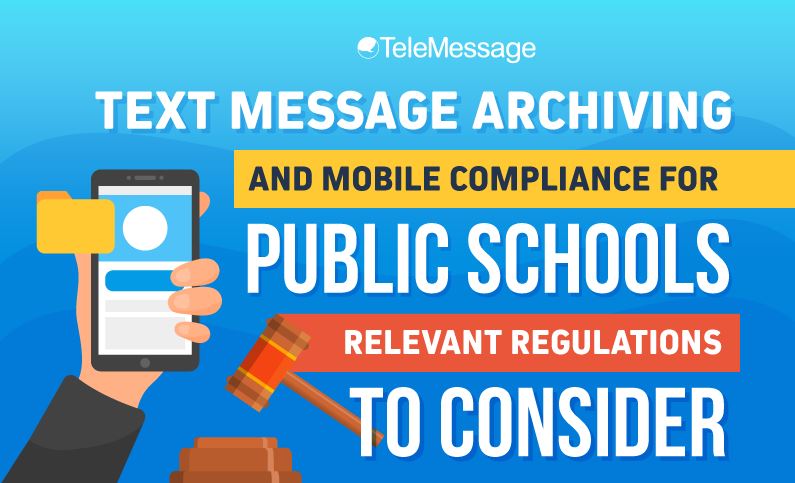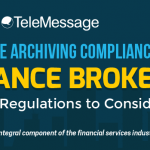Texting is no longer a taboo nor an exceedingly casual mode of communication among public school administrators and teachers.
Surveys found that more and more public elementary schools, high schools, and universities are using text messaging, along with voice calling and instant messaging as means to enhance their parent outreach efforts and improve student body involvement in campus events.
However, despite the opportunities from utilizing these contemporary communicate channels, understanding the depth of regulations concerning compliant use of text messaging remains an unchartered territory for many public schools. While highly effective in engaging students and parents, regulators still view text messages sent by organizations, including public schools (including alerts and one-time information requests) as transactional – meaning they are still defined as marketing messages.
These types of electronic communications are highly-regulated, and therefore must be monitored and supervised closely by public school administrators. This involves the duty to capture and record mobile SMS, which is a primary focus in most electronic records public records laws such as Freedom of Information Act, Open Records Laws, among others.
To help public schools navigate the compliant use of text messaging, we detail in this infographic the background of the top regulations for text message archiving and mobile compliance.

TCPA
Under the amended Telephone Consumer Protection Act (TCPA), organizations including government-funded schools are restricted to use text messaging and automated calls to deliver information to their constituents around the area unless they obtain explicit permission (opt-in) of the owner of the phone number.
Implemented to prevent telemarketers from breaching the mobile privacy of the public, the updated TCPA presents new challenges for public schools that rely on text messaging to send notification messages to the parents.
FCC provided a list of school-initiated messages that require prior consent of the recipients:
- calls relating to parent-teacher conferences,
- surveys that provide input on school-related issues, and
- notifications about general school activities.
FCC clarified, however, that if a student or parent provides their cellphone number as their only contact point of contact, they already provided consent to be contacted about school-related messages.
FCC provided another statutory exception in TCPA liability, i.e., those messages that are for “emergency purposes.” What only remains a challenge for public schools is to identify which of their messages fall under this category.
Fortunately, the FCCC listed several examples that should be considered emergencies:
- Time-critical events such as school lockdown, fire, health emergencies, safety threats, etc.
- Dismissal announcement for reasons such as inclement weather, special events, facility maintenance, etc.
- Unexcused absences by students.
Non-compliance to this rule is hefty, with penalties ranging from $500 per violation to $1,500 for violations that are willfully and knowingly committed.
FOIA and State Open Records Laws
The Freedom of Information Act (FOIA) and Open Records/Sunshine Laws are federal and state laws which require government institutions to respond to records requested by any member of the public within 10 days. Public records include electronic communication such as text messages, chats, voice calls, emails, and social media posts.
To respond to FOIA and Open Records request for school-related mobile communications, such as text message conversations between district administrators, academic staff, employees and their constituents, public schools should first be able to capture and record those texts.
Public schools are increasingly using mobile archiving tools with SMS recording features to make a real-time recording of text messages possible and seamless across all the mobile devices in their organization.
Investing in such tool not only frees public schools from the burden of making an in-house system to manage their mobile communications but also enables their staff to stay productive and engaged with the students and parents that prefer to send or receive a text when discussing school matters.
FERPA
Similar to FOIA and Open Records Laws, the Family Education Rights and Privacy Act (FERPA) gives rights to families to request education records of their child either personally or via email or an online submission form.
The education records that can be requested can include text messages that contain information such as the grades of the student, inquiries made by the student to any school personnel, or information that can prove that the student is at risk of cyberbullying or harassment by any public school official or employee.
With the TeleMessage Mobile Archiver, public schools can effectively satisfy their compliance, regulatory, and eDiscovery obligations and reduce risks of using mobile communications in texting the students and parents.
Our Mobile Archiver captures and records mobile content, including SMS, MMS, voice calls, social media, and WhatsApp Chats from corporate or BYOD mobile phones. Messages are securely and reliably retained within TeleMessage servers or forwarded to an archiving data storage vendor of your choice.
Our mobile archiving products securely capture content from mobile carriers and mobile devices for a variety of ownership models (BYOD, CYOD, and employer-issued). With our multiple archiving methods, you can always find the right tools or blend for your text message archiving and voice call recording requirements:
TeleMessage offers cross-carrier and international mobile text and calls archiving for Corporate and BYOD phones. Visit our website today to learn more about how we can help your organization stay compliant with text archiving regulations.





